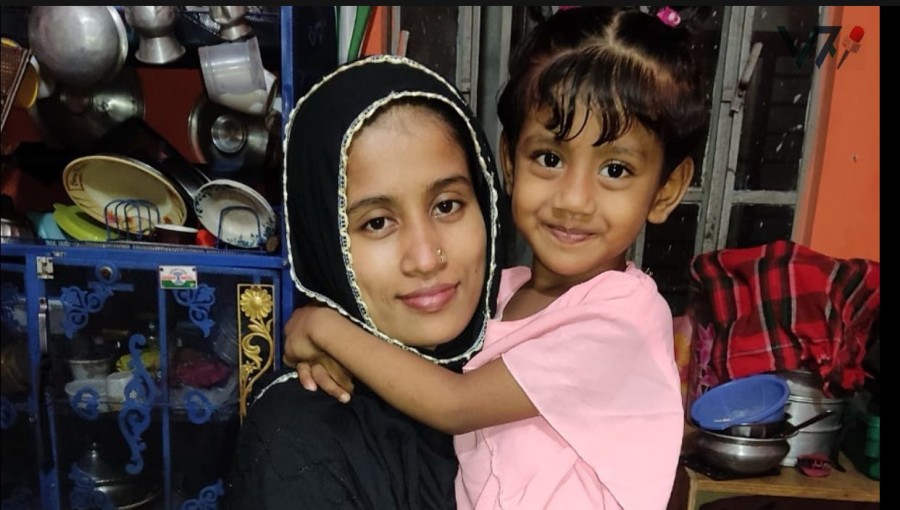
Photo: Collected
Nazma Begum, a garment worker from Chattogram, fought against workplace injustices and won a legal battle for her rights, highlighting the struggles faced by working mothers in Bangladesh. The photo is published with permission of Nazma Begum.
Ctg June14,(V7N)- Nazma Begum, a courageous mother and garment factory worker, embarked on a journey marked by resilience and determination. Employed as an assistant operator at Rtzyi Apparels, Chattogram, since April 1, 2018, Nazma faced unprecedented challenges when she became pregnant in 2019. Her story sheds light on the harsh realities many working mothers endure in their pursuit of justice and fair treatment in the workplace.
In 2019, Nazma's world turned upside down as she prepared for her impending maternity leave. Shockingly, she was informed by a personnel officer named Sarwar that the factory had no precedent for granting maternity leave. Despite facing pressure to resign, Nazma stood her ground, refusing to succumb to unjust demands. However, her defiance led to further coercion, with Sarwar forcibly taking her ID card and compelling her to sign resignation papers under false pretenses.
Fighting for her rights, Nazma sought assistance from labor leader Abdul Wadud Jibon, who connected her with Bangladesh Institute of Labour Studies (BILS) officials. With the support of BILS Officer Fazlul Kabir Mintu, Nazma's case gained momentum, eventually compelling the factory management to retract their decision and grant her maternity leave.
Despite this victory, Nazma's struggles were far from over. Upon her return to work after the initial 56 days post-delivery, Nazma encountered yet another hurdle – the absence of a daycare center at the factory. Forced to bring her child to work and provide bedding, Nazma persevered, determined to provide for her family. However, the onset of the COVID-19 pandemic brought new challenges, leading to the termination of the worker assisting with her child's care and subsequent paid leave for Nazma.
Despite these setbacks, Nazma's termination on October 12, 2020, marked a grave injustice, prompting her to pursue legal recourse with unwavering resolve. With the guidance of labor leaders and the support of BILS, Nazma embarked on a legal battle (IR Case No. 85/2020, 2nd Labour Court, Chattogram) that lasted three and a half years. The court's ruling in her favor on March 21, 2024, provided a semblance of justice, ordering her reinstatement.
However, Nazma's victory was bittersweet, marred by the prolonged duration of the legal process, which far exceeded statutory limits. According to Section 216 of the Bangladesh Labour Act 2006, a judgment should be rendered within 60 days of filing the case, extendable by another 90 days if necessary, totaling a maximum of 150 days. Nazma’s case, however, took 1,227 days. Moreover, the 1,227 days spent unemployed were deemed unpaid leave, highlighting the systemic injustices prevalent in the labor sector.
In response to the judge's verdict, BILS official Fazlur Rahman Mintu commented, "We have only learned about the story of one Nazma here. However, across Bangladesh, thousands of Nazmas are continuously facing various injustices, which often go unreported. From Nazma's story, we can get a glimpse of the harsh realities that expectant mothers face in the workplace in this country.
Since Bangladesh's garment industry is part of the global supply chain, there is some level of control by foreign buyers and donor countries and organizations over this sector. Nevertheless, if such a disappointing picture is seen in this sector, one can easily imagine how dire the situation is in other sectors. To overcome this situation, all relevant institutions, various trade union federations, and representatives of civil society need to work together." He noted that BILS bore the entire cost of Nazma's case.
Nazma Akter told Voice7's reporter that although the honorable court ordered her reinstatement, the garment authorities are preventing her from rejoining work. When contacted, the garment's HR manager, Choton, said that they have already appealed against the verdict in the higher court.
In conclusion, Nazma Begum's courageous struggle and legal battle epitomize the resilience of workers in the face of adversity. Her story underscores the imperative of collective action to dismantle systemic injustices and build a society where every worker is treated with dignity and respect.
END/V7N/AZC/DK/

Comment: